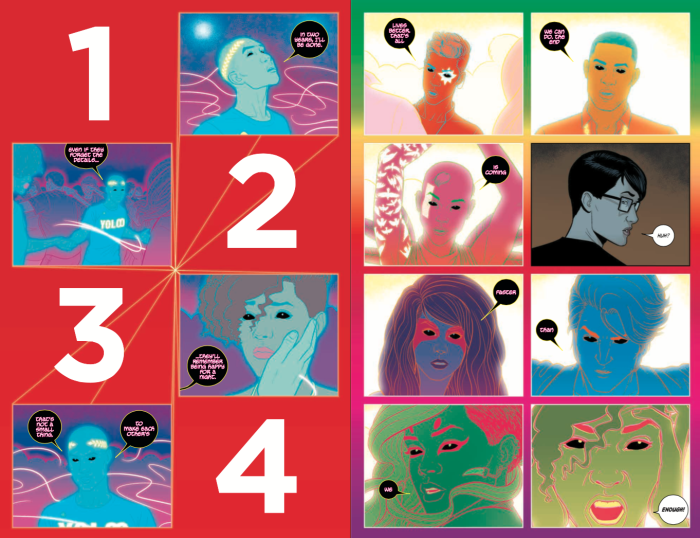By Patrick Ehlers

This article contains SPOILERS. If you haven’t read the issue yet, proceed at your own risk!

I just finished reading Who Killed My Daughter?, fiction writer Lois Duncan’s real life account of her daughter’s murder in 1989. It’s less a narrative, and more a collection of interviews with police, transcriptions from psychic readings, re-printed newspaper articles, and half-remembered conversations with loved ones. But the book opens and closes with the saddest, richest, most beautiful and heartbreaking mediations on love, loss and acceptance I’ve ever read. The explicitly stated point of the book was to bring tipsters out of hiding, to provoke someone who knew something to come forward, but for these moments, Duncan nakedly expresses her feelings. The truth is, the mess of primarily source documents that pad WKMD‘s page count add immeasurably to the expression of Duncan’s grief, because that’s what loss is — confusion, contradiction, a mess. Saladin Ahmed and Christian Ward’s Black Bolt 9 embraces that same messiness to say farewell to Crusher Creel.
The issue starts in something of a familiar place, with Black Bolt and Mary squaring off. Of course, Black Bolt comes in peace, but y’know, we’ve got hero-villain dynamics to fulfill here, so it comes to blows immediately. The fighting is stopped when Blinky steps up and offers Mary a vision of her husband as a good man who sacrificed himself to save his friends. This is the first of many left turns the issue makes as Ahmed summarily rejects the label of “villain” for ol’ Crusher. Ward recognizes this and sets the moment off with a goddamn fireworks show:

This is the page around which the entire narrative pivots away from superhero punch-em-up silliness and moves into the very real and very messy business of grieving. Ahmed and Ward treat us to some scenes that are almost absurd in how grounded they are. I mean, we go inside Mary and Carl’s apartment! If I’ve typed a more mundane sentence for this website, I don’t know what it is. These are larger than life characters, reduced to their stupid humanity (or inhumanity, as it were) to process a loss.
The cast slowly balloons, awkwardly incorporating the changes to the Marvel mythology every time a big Avenger shows up to pay their respects. Steve Rogers tries to explain all of Secret Empire before realizing none of that matters here — he just needs to be here for his friend. Ditto Thor-Not-Thor, whose appearance makes the funeral attendees bicker about who or what he even is now. This, to me, is the quintessential experience of gathering family to grieve. No one is who you remember them to be: while you’re all united by your connection to the deceased, you are separated by life, time and experience. It’s remarkable that a funeral for a villain, attended by aliens, gods and unfrozen supersoldiers, would be so damn relatable, but well, here we are.

The conversation doesn’t stop there. What do you wanna talk about from this issue?
Advertisements Share this:




